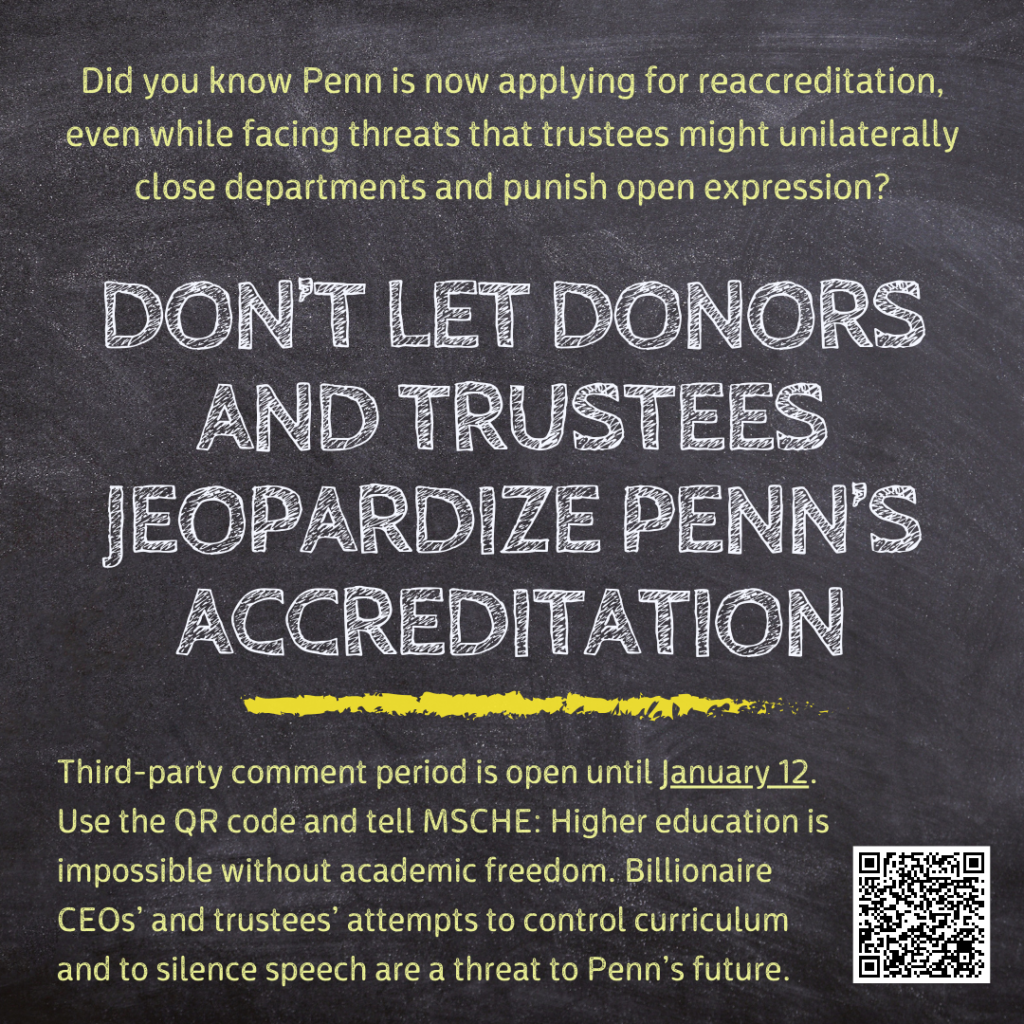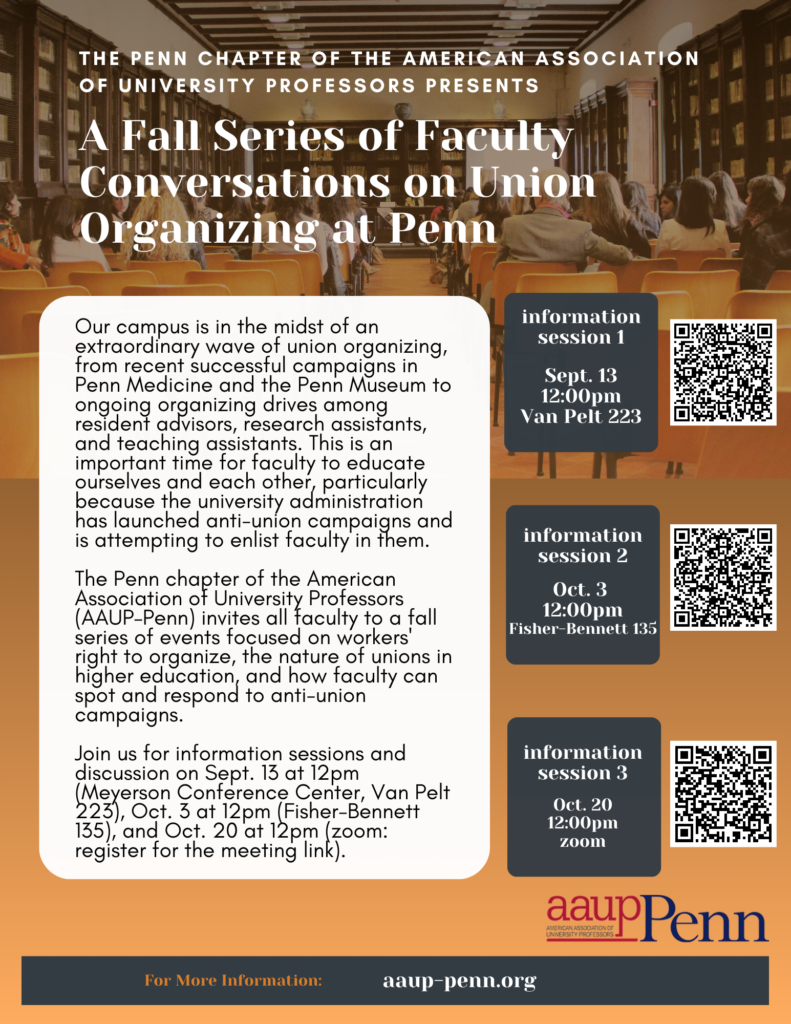Unelected Trustees and Billionaire Donors Are Jeopardizing Penn’s Accreditation

Take action and spread the word:
Penn is currently applying for reaccreditation—and to be accredited, universities must demonstrate adherence to principles of academic freedom, freedom of expression, faculty governance, and diversity. The recent actions of unelected trustees and donors have put the University’s accreditation at serious risk. A letter circulated among the trustees by a private equity billionaire suggests that they might unilaterally close departments, change hiring criteria (with the aim of destroying diversity and equity initiatives), and impose a speech code to discipline students and faculty for political expression. Attempts by donors and trustees with no academic qualifications to control curriculum and research, silence speech that they disagree with, shutter departments, interfere in faculty hiring, and end DEI policies are an assault on higher education, and they clearly threaten Penn’s accreditation.
The accreditation process gives us an opportunity to act.
We are calling on all colleagues, allies across higher education, and concerned members of the public to participate in the comment period between now and January 12.
Allies beyond Penn and members of the public who want to defend students’ right to learn and preserve the university’s educational mission: Submit a Third-Party Comment to the accrediting agency (MSCHE) to express your concerns; see below for a sample message. Comments are due January 12, 2024.
Penn faculty, staff, and students: Write to Penn’s Self-Study Steering Committee, which is charged with writing a report to the external accrediting agency. Comments are due by January 12, 2024:
- Urge them to tell the truth in their report to the accrediting agency (MSCHE): academic freedom, shared governance, open expression, and DEI policies are gravely endangered at Penn and must be strengthened. The accreditation process is an instrument of accountability: we must use it. (The current draft of the report does not contain a single mention of “academic freedom.”)
- See below for a sample message.
Please share this call widely with all those who care about the future of higher education. We ask everyone—faculty, staff, students, alumni, and the public—to submit comments and sound the alarm:
Penn must uphold the principles of academic freedom and shared governance in order to retain its accreditation, and to remain a university in anything more than name.
Below is a sample message you can use when you submit your comment:
Sample message on accreditation:
I write to express my grave concern that Penn’s accreditation is threatened by donors, trustees, and administrators who are attempting to undermine academic freedom, shared governance, open expression, and DEI policies at the university.
Penn’s self-study must tell the truth about the crisis at our university: academic freedom, shared governance, and open expression have already been compromised, and Apollo CEO Marc Rowan’s recent questions to the Penn trustees raise the specter of their total destruction. To preserve the educational and research mission of the university, we must use the reaccreditation process as intended: it must be an instrument of accountability.
Penn’s self-study must clearly state that the following principles and standards required by Penn’s accrediting agency, the Middle States Commission on Higher Education, are gravely endangered at the university today:
- “academic freedom, intellectual freedom, freedom of expression”
- “fair and impartial practices in the hiring, evaluation, promotion, discipline, and separation of employees”
- “student learning experiences that are designed, delivered, and assessed by faculty”
- “a general education program that…offers a sufficient scope to draw students into new areas of intellectual experience, expanding their cultural and global awareness and cultural sensitivity”
- “graduate…opportunities for the development of research, scholarship, and independent thinking, provided by faculty and/or other professionals with credentials appropriate to graduate-level curricula”
- “a climate that fosters respect among students, faculty, staff, and administration from a range of diverse backgrounds, ideas, and perspectives”
- “a clearly articulated and transparent governance structure that outlines roles, responsibilities, and accountability for decision making by each constituency, including governing body, administration, faculty, staff and students”
The AAUP-Penn Executive Committee, as well as national news outlets, have documented numerous threats to these principles and standards. To name just a few:
- Beginning in the summer of 2023, donors, trustees, and lobbying organizations pressured the university to cancel a festival devoted to Palestinian literature organized by faculty, claiming that it was a platform for antisemitic messages—a claim refuted by journalists who attended the festival. Canceling the Palestine Writes Literature Festival would have violated Penn’s Guidelines on Open Expression and core principles of academic freedom. When the university administration rightly refused to cancel the festival, donors launched a wider campaign to destabilize the university.
- In September, under pressure from donors and lobbying organizations, administrators unilaterally changed curricular requirements in the Department of Near East Languages and Civilizations without the knowledge or consent of the faculty teaching the classes.
- In November, the university refused to allow a Jewish student organization, Penn Chavurah, to screen the award-winning documentary Israelism, which follows young Jewish Americans who traveled to Israel and Palestine and developed critical perspectives on Israeli government policies. When Penn’s Middle East Center volunteered to host this screening and reserved a room for that purpose, the university administration pressured the center’s director to cancel it, and the director resigned in protest. The university has since threatened to discipline the students for screening the film.
- The university administration has failed to publicly condemn, and has even contributed to, the targeted harassment of faculty members who have been defamed as antisemites and threatened with violence for voicing criticism of Israeli government policies and warfare, for expressing solidarity with Palestinian civilians, and for speaking out in grief and anguish about the humanitarian crisis in Gaza. The harassment of individual faculty members appears to have been systematic, coordinated, and has included highly publicized attacks by members of Congress. As the national AAUP has made clear, targeted harassment undermines the academic freedom of all faculty members, as it exerts a chilling effect on protected extramural speech, research, and teaching. It is the responsibility of university administrators to condemn targeted harassment in order to protect academic freedom.
- In December, Apollo CEO Marc Rowan circulated a list of questions to Penn’s Board of Trustees that seem to suggest that trustees with no academic expertise carry out a hostile takeover of the core academic functions of the university—functions related to curriculum, research, and the hiring and evaluation of faculty. Rowan’s letter asks, “Should any of the existing academic departments be closed?” It seems to propose unilateral changes by trustees to “instruction of students,” changes in “criteria for qualification and admission for membership in the Faculty,” and a “Code of Conduct” to constrain campus speech. And it raises the possibility that the university might discipline faculty for “promoting a particular viewpoint.”
The accreditation process presents us with an opportunity to defend and strengthen the principles of academic freedom, faculty governance, open expression, and diversity and equity. It presents us with an opportunity to stand up to the threats of donors who neither understand nor respect the educational and research mission of the university. We must use this opportunity to ensure a strong faculty voice in the governance of the university, protect the integrity of research and teaching, and safeguard policies that promote diversity and equity.
Sincerely,
X




